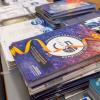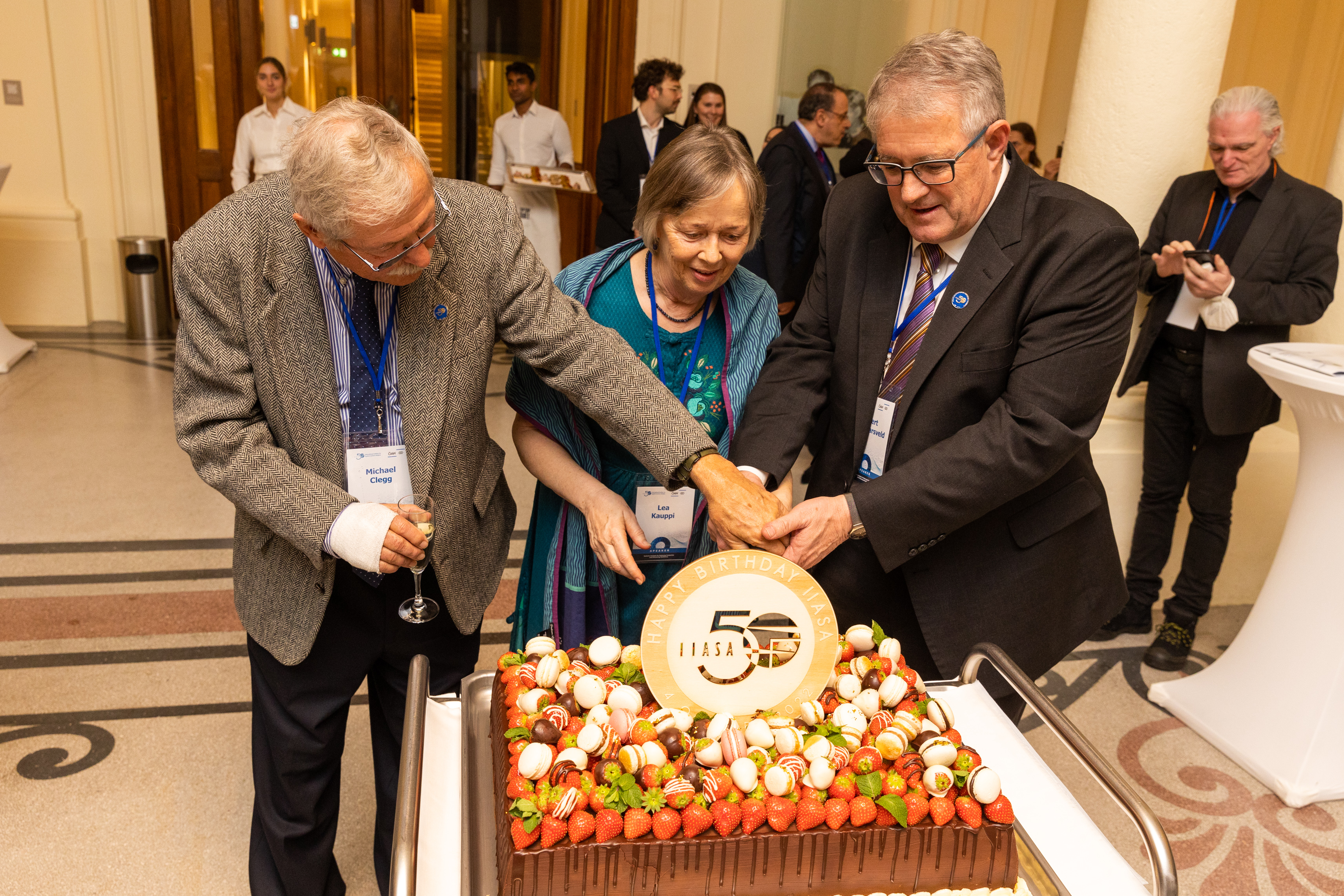
Options Magazine, Summer 2023: IIASA Advancing Systems Analysis Program Director, Elena Rovenskaya, and Viktor J. Bruckman, National Member Organization Secretary for Austria, reflect on the main topics discussed at this jointly organized hybrid event that formed part of the IIASA 50th anniversary celebrations.
The institute’s 50th anniversary was celebrated with a range of events worldwide. From 16 to 17 November 2022, IIASA and the Austrian Academy of Sciences (ÖAW) – the IIASA National Member Organization for Austria – organized a hybrid conference in Vienna that brought together more than 550 participants. The event demonstrated how systems analysis has evolved and how it can contribute to solving many of today’s global challenges, while also exploring emergent trends in this transdisciplinary field.
A world-leading institute for analyzing complex socio-environmental systems
IIASA was founded in 1972 amid the cold war with the aim to foster collaboration between East and West. Its founding principles were to employ multilateralism and science as a common language to bridge ideological divides and to address challenges arising from economic and technological development. Over the years, the world’s geopolitical landscape may have transformed, but it has not become less complex. The demand for science diplomacy remains high as it has proven effective for addressing “wicked” policy problems characterized by incomplete information, uncertainty, high stakes, ambiguity of responsibilities among stakeholders, conflicts, and different problem framings.
Frequently, our solutions to past problems ended up being the underlying causes of new problems. Climate change, biodiversity loss, growing socioeconomic, health, and environmental inequalities, demographic change, and disruptive events such as large-scale natural disasters or pandemics and geopolitical conflicts, are impacting essential domains that sustain our society. Our continued wellbeing is becoming increasingly precarious, which requires more effective ways to govern common goods, and take advantage of new advanced technologies, data, models, and theories. By putting systems thinking into practice, systems analysis can deliver integrated solutions and demonstrate the value of cooperation and multilateral action, thus providing a framework to address global challenges.
Building on fifty years of international and interdisciplinary collaboration and experience, IIASA has become a trusted platform for science, policy, and societal exchange to inform and support the transformation of our society to sustainability.
Transformation to a sustainable, equitable, and resilient world
Given the growing frequency, severity, and propagation capacity of both natural and man-made disruptive events leading to their global impacts, the resilience of socio-environmental systems is becoming increasingly important, alongside sustainability and equity. The resilience of socio-environmental systems, a concept rooted in the theory of complex adaptive systems, was pioneered by C.S. Holling, who served as the third Director of IIASA in the early 1980s. Today, resilience is understood as the ability of individuals and communities to respond to and navigate change; including the ability to absorb and adapt to change, but also to transform with change. Discussions during the event explored how resilience considerations nuance our understanding of sustainable development, and how this can in turn lead to shifts in the focus of decision makers and experts to promote a transformation to a more sustainable and equitable society.
While the transformation to a sustainable, equitable, and resilient world is a global challenge, decisions are often taken and implemented locally and are driven by individuals. Several critical aspects were highlighted by conference participants:
- At the global and universal scale
- the challenge of finding balanced economic policies to ensure that human needs are universally satisfied;
- the nexus of culture, science, and technology, which, if directed appropriately, can provide significant leverage for achieving sustainability transformation;
- the special role of transdisciplinary science and science diplomacy as catalysts of transformation; and
- the need to advance effective science translation and communication.
- At the local scale
- the incorporation of the local context, including the knowledge, expectations, and demands of indigenous communities to make research truly policy-relevant;
- citizens’ expectations that governments become more interventionist; and
- resilience and stability objectives that need to be institutionalized.
- At the individual scale
- the powers and limitations of the human brain, which combines emotional and rational responses;
- the power of positive incentives and co-benefits for stimulating pro-environmental behavior; and
- the ability of people to imagine different futures.
Novel systems-analysis methods, approaches, and data to address global challenges
Advancing the methodology of systems analysis is an indispensable facet of IIASA research. Prompted by rapidly developing computing capabilities in the second half of the 20th century, systems analysis emerged as a techno-social science, seeking to improve policy development by detaching decision making from fallible humans, relying instead on computer-enabled systems modeling and simulation. Through advances in operations research and other methods, systems-analysis modeling revolutionized our ability to optimize decisions in settings where perfect information and the rational behavior of agents were acceptable approximations of reality.
Today, systems analysis strives to enhance relevance by integrating pertinent human and institutional factors into research and models. The lack of social factors and feedback might have been one reason why some technocratic models, such as some state-of-the-art models predicting the pace of energy transitions, did not perform well in forecasting. The conference underscored the power of several methodologies and approaches to incorporate people into research including:
- Evolutionary game theory that models bounded rationality with recent insights regarding new mechanisms for upscaling cooperation based on reciprocity and democratic decision making.
- “Rough” systems analysis that provides tools to quickly solicit and integrate expert knowledge and harness systems thinking.
- Fuzzy sets theory, random set theory, and imprecise probability theory to encode qualitative uncertainty and ambiguous information.
- Theory of plural rationality that allows the structuring of different worldviews by various stakeholders.
The event also showcased recent progress, including:
- Advancements in foresight methodology to optimize the use of scenarios to embrace future uncertainty.
- Case studies combining the strengths of conventional expert modeling and participatory research to address complex problems of environmental governance.
- Novel approaches to link together individual country models to test the consistency of national development plans with planetary boundaries.
- The first-ever incorporation of political and institutional factors into climate change scenarios informed by Integrated Assessment Models (IAMs).
Presently, innovation in systems analysis often takes place in the realm of data and data analysis. In this context, the conference showcased a number of studies utilizing new data sources including Earth observation, citizen science, mobile phone data, digital platforms (e.g., Google), and social media. For example, using the experience of COVID-19, participants highlighted that geolocation data from mobile phones can provide information on people’s mobility, which can be useful to anticipate the patterns of an epidemic’s spread and the economic impacts of mobility restrictions. As another example, how citizen science provides missing data for the Sustainable Development Goals indicators was discussed. The conference also emphasized the power of modern dynamic and interactive visualization techniques in conveying the intricate narratives presented by socioeconomic data, while underscoring the challenge of communicating uncertainty.
Advances in science-for-policy
Policymakers tasked with protecting human health and wellbeing, as well as environmental resources must develop policies and decide on investments that can best prepare our systems for an uncertain future, given multiple interconnectivities and tradeoffs. The sustainable management of the water-energy-food-land-ecosystem nexus, together with adjacent sectors including mobility, finances, and conflicts is a prime example of a policy challenge that requires a systems approach. Siloed approaches, which are still prevalent in many parts of the world, lead to unwanted cross-sectoral impacts and inefficiencies. Policymakers are increasingly becoming aware of the need to approach “wicked” policy problems through a systems view, which creates a demand for transdisciplinary science that is able and willing to cooperate with policymakers with input that is timely, agile, robust, and modest, while respecting confidentiality. Policy decisions on “wicked” problems are often unpopular hence communication and framing are crucial.
The conference underscored that IIASA has been successful in facilitating science-informed policies utilizing its models and participatory research. The IIASA GAINS model, for instance, has been used to support air pollution regulation in the EU. Multiple partnerships with policymakers through participatory research have helped to inform policies at the local and national levels to deal with “wicked” problems. Experience demonstrated that several factors make a crucial contribution to the success of science-for-policy work. This includes:
- Long term partnerships and trust between scientists and policymakers.
- A good understanding of policy processes and their characteristics including timing, political economy, and governance aspects.
- The diversity of stakeholders in the policy co-production process and recognizing and respecting the different worldviews of stakeholders.
- Focusing on compromise rather than consensus.
The conference participants discussed that transdisciplinary research is a combination of science, art, and craft. The main challenges are that policymakers, stakeholders, and scientists speak different languages and operate under very different incentives. Experimentation is crucial for policy innovation. There is a demand for honest brokers and boundary spanners who work across science and policy to facilitate science-informed policies.
With the rise of social media and political populism, science is losing its “monopoly on the truth”. In the coming years, the institute’s mission will be to strengthen transformative science towards the establishment of a post-Agenda 2030 program with a stronger focus on interconnections between objectives, as IIASA successfully did in the past during the drafting of the UN Sustainable Development Goals.
Publications
Duller, Matthias. (2016). Internationalization of Cold War systems analysis: RAND, IIASA and the institutional reasons for methodological change. History of the Human Sciences. 29. 172-190. 10.1177/0952695116667882


